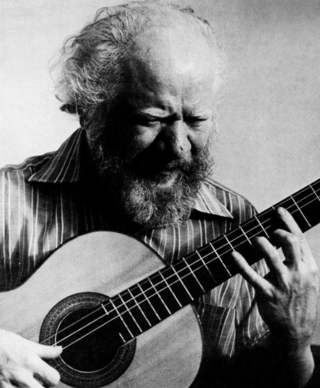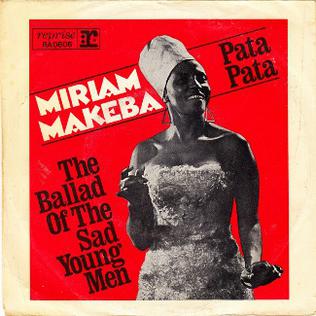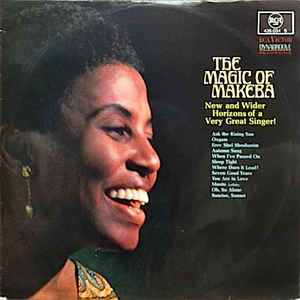
An extended play (EP) is a musical recording that contains more tracks than a single but fewer than an album or LP record. Contemporary EPs generally contain four to five tracks, and are considered "less expensive and time-consuming" for an artist to produce than an album. An EP originally referred to specific types of records other than 78 rpm standard play (SP) and LP, but it is now applied to mid-length CDs and downloads as well. In K-pop they are usually referred to as mini albums. Ricardo Baca of The Denver Post said, "EPs—originally extended-play 'single' releases that are shorter than traditional albums—have long been popular with punk and indie bands." In the United Kingdom, the Official Chart Company defines a boundary between EP and album classification at 25 minutes of maximum length and no more than four tracks.

Zenzile Miriam Makeba, nicknamed Mama Africa, was a South African singer, songwriter, actress, and civil rights activist. Associated with musical genres including Afropop, jazz, and world music, she was an advocate against apartheid and white-minority government in South Africa.

A Date with Elvis is a compilation album by American singer and musician Elvis Presley, issued on RCA Victor in July 1959. The album compiled a selection of previously released material from multiple sessions at Sun, an August 1956 recording session at 20th Century Fox Stage One and two from Radio Recorders in Hollywood. The album reached #32 on the Billboard Top Pop Albums chart.

Severino Dias de Oliveira, known professionally as Sivuca, was a Brazilian accordionist, guitarist and singer. In addition to his home state of Paraíba, Brazil, and cities Recife and Rio de Janeiro, he worked and lived in Paris, Lisbon, and New York City intermittently. He has two daughters, Wilma Da Silva and Flavia de Oliveira Barreto.
"Manhã de Carnaval", often referred to as "Black Orpheus", is a song by Brazilian composer Luiz Bonfá and lyricist Antônio Maria.

"Pata Pata" is an Afro-pop dance song popularized internationally by South African singer Miriam Makeba. "Pata Pata" is credited to Makeba and Jerry Ragovoy. Her most popular recording of "Pata Pata" was recorded and released in the United States in 1967. The song is considered by many to be Makeba's signature hit and it has since been recorded by many artists.

Belafonte Returns to Carnegie Hall is a live double album by Harry Belafonte. It is the second of two Belafonte Carnegie Hall albums, and was recorded May 2, 1960. It peaked at No. 3 on the Billboard Pop albums charts.

An Evening with Belafonte/Makeba is a Grammy Award-winning 1965 album by Harry Belafonte and Miriam Makeba, released by RCA Victor. It was the second outcome of the long lasting collaboration between Belafonte and Makeba, the first being the appearance of Makeba in the song "One More Dance" on Belafonte's 1960 album, Belafonte Returns to Carnegie Hall.

Miriam Makeba is the debut album by Miriam Makeba. It was released in 1960 by RCA Victor.
The Belafonte Folk Singers were a vocal group who were active from 1957 to 1965. They were named after singer Harry Belafonte, for whom they originally formed in order to serve as a backing group for recording and concerts. The group was mostly led and conducted by Robert De Cormier, also billed as Bob Corman. Milt Okun sometimes conducted the group as well.

Gainsbourg Percussions is the sixth studio album by French musician Serge Gainsbourg, released in 1964. Gainsbourg reinvents his style with Latin, African, and Cuban influences. It would be his last album before 1968.
"Soweto Blues" is a protest song written by Hugh Masekela and performed by Miriam Makeba. The song is about the Soweto uprising that occurred in 1976, following the decision by the apartheid government of South Africa to make Afrikaans a medium of instruction at school. The uprising was forcefully put down by the police, leading to the death of between 176 and 700 people. The song was released in 1977 as part of Masekela's album You Told Your Mama Not to Worry. The song became a staple at Makeba's live concerts, and is considered a notable example of music in the movement against apartheid.

Zanaka is the first studio album by French singer-songwriter Jain, released on 6 November 2015. The album's title means "child" in Malagasy, and is a tribute to her mother who is of Franco-Malagasy origin.
This is a discography of South African musician Miriam Makeba (1953-2008).

Pata Pata is a 1967 album by Miriam Makeba. The album charted at number 74 in the US albums chart. Most of the recordings were new, though Sivuca's "Maria Fulo" was included again, from the previous album All About Miriam.

The Many Voices of Miriam Makeba is a 1962 studio album of Miriam Makeba.

The Voice of Africa is the 1964 fourth album of Miriam Makeba issued by RCA Victor. It charted at #122 on the US album chart.

Makeba Sings! is the fifth album by Miriam Makeba, released by RCA Victor in 1965. The album charted at number 74 in the US album chart.

The Magic of Makeba is the seventh album by Miriam Makeba released in 1965 by RCA Victor. The album saw Makeba branching out into new material arranged by conductor Sid Bass, but it gained mixed reception and was her final album for RCA Victor.

The Magnificent Miriam Makeba is a 1966 album by Miriam Makeba. It was her first album after moving from RCA Victor to Mercury.
















